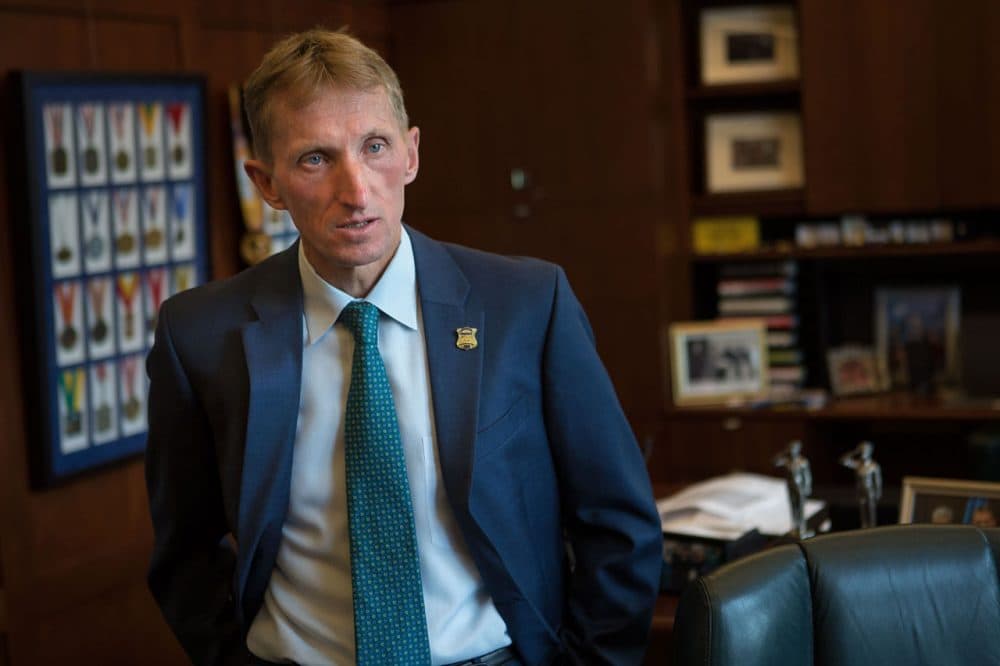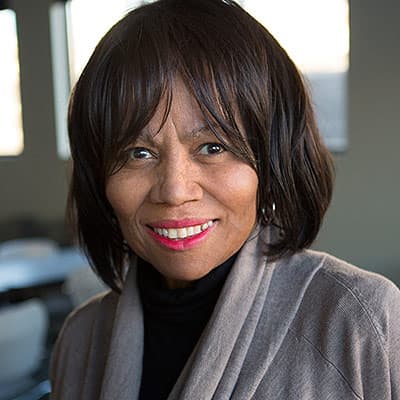Advertisement
Boston Police Aim To Increase Diversity On Force, But Challenges Persist In Hiring
Resume
The city of Boston's newest police officers are getting to work this week on their first assignment — patrolling high crime neighborhoods in the city. Increasing racial diversity on the Boston force has been a goal for decades, but the make-up of the new class falls short.
Of the 41 Boston recruits who graduated from the police academy last week, 32 are white, six are Hispanic, two are black and one is Asian. Overall, two-thirds of the uniformed police force in Boston is white, in a city where 53 percent of residents are people of color.
Police Commissioner William Evans says an important part of the newest officers' training was time spent getting to know the city.
"One of the recruits was from Portland, Maine — grew up, all his life. He said 'You know what, I really got a lot out of visiting the neighborhood.' I think he said it's probably the first time he ever interacted with an African-American in his life. So that's the problem we have sometimes," says Evans. "We're bringing people in who didn't grow up in the city. They don't even understand the culture of the city."
The diversity in the Boston department is expected to decline, says Larry Ellison, the president of Massachusetts Association of Minority Law Enforcement Officers (MAMLEO). Diversity in the police force increased only after a 1974 federal consent decree, he says. The expired court order set goals and time tables for hiring and promotions of black and Hispanic officers to address decades of past discrimination.
"We're bringing people in who didn't grow up in the city. They don't even understand the culture of the city."
William Evans, Boston Police Commissioner
"The large number of classes that came on like when I came on in '85, those classes are close to retirement age, some have already gone," Ellison says. "Within the next five to 10 years, you're going to see the police department look like it did probably in the '60s."
And Evans says current civil service requirements make hiring more people of color, particularly residents of Boston, difficult. That's because state laws mandates that military veterans be given preference over other applicants.
"The problem we're having right now is veterans are coming from all over the country, getting on this list," Evans says. "I'm all for the vets, they served our country, but right now they're taking a lot of jobs away and hurting our city kids — whether white, black, Latino — from actually getting a job."
However, Boston's Commissioner of Veterans' Services Giselle Sterling says, "to have our veterans come home and fight harder for employment is not a good policy and anything that we as a city could do to remedy that is helpful. The ideal situation in the hiring practice would be to have veterans preference with a residency preference as well, because we want our police force and first responders to be a reflection of the people we are serving."
And that's what one city councilor wants to do. At-Large Councilor Michael Flaherty is proposing a requirement that anyone who wants to join the police or fire departments live in Boston for at least three years before they could take the civil service test. Currently, the requirement is only one year.
The chief of professional development for the police department offers a simpler solution. Superintendent Lisa Holmes says the city needs to recruit more minority veterans.
"We have to abide by their standards which require that certain groups get hired. ... What we need to try to find out is why minority and women veterans are not applying for these positions — that's the bigger question," says Holmes.
Mayor Marty Walsh and Evans have another plan — reviving the police cadet program.
"It's an apprenticeship for two years. When you get paid, after two years, you get the same status as the veterans do, and that will allow us to get more diversity on the job," says Evans. "So we're working to do that."
Evans and some key members of his command staff all began their careers as cadets. Ellison of MAMLEO also came to the department as a cadet, but says it's not enough. He says it would take at least two years for the cadet program to have any impact and a solution is needed now.
This article was originally published on June 22, 2015.
This segment aired on June 22, 2015.
